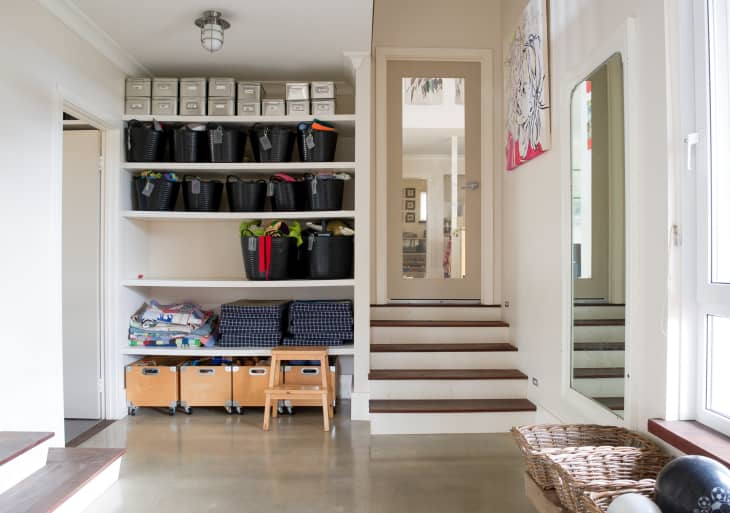This Smart Decluttering Tip Will Also Save You Money

I’m someone who, for better or for worse, accumulates stuff. A delicious-smelling candle that happens to be half off? I’m bringing two home, one for me, and one for a friend. That box of free kitchen gear at the garage sale? I’m taking it, just in case. The rare occurrence of high-ply toilet paper at Target? Consider my cart full.
While it’s always good to be prepared (I think!), this habit comes with a downside: It adds clutter to my home. Which is why I’m always looking for some creative ways to keep my “extras” organized.
If this sounds like you, the answer is to create a bonus inventory space—or spaces, really. This works for everything from extra household supplies to duplicate kitchen utensils to gifts you bought on sale for whenever you might need them.
Here’s how:
Corral your household supplies.
Thanks to the pandemic, you might keep an abundance of extra household supplies on hand to prevent trips to the store (or, say, to be prepared for another toilet paper shortage). Nicole Leaks, founder of Personl-Space, calls those back-up supplies “bonus inventory.” While these items prove helpful in a pinch, your bonus inventory can also add to clutter if you don’t have a system.
Leaks has an easy solution: Designate a space for your bonus inventory. For example, rather than keeping your extra toothpaste in the drawer next to your half-used tube, keep it in a designated spot—ideally, in a bin or basket—in your linen closet. Same goes for, say, extra toilet paper. Rather than shoving it in your vanity cabinet or in a basket on the bathroom floor, stow it in the bonus inventory spot with all your other bathroom supplies. Then, next time you need something, you’ll know exactly where to go to replenish it.
If you’re someone who keeps a bigger bonus inventory on hand, Leaks recommends keeping the extras in a larger space, like a basement or garage, and replenishing your more accessible storage area from there. “This reduces the amount of clutter in your smaller places that are occupied more often,” she says.
Shop your own duplicates.
In some cases, you don’t build up bonus inventory on purpose. Take your kitchen for example. Over the years, let’s say you’ve accumulated an extra potato masher and pizza cutter, a few extra spatulas, and a couple bonus ice cream scoops. You’ll probably need all these kitchen essentials at some point, so you’d rather not get rid of them. But you can hardly open your drawer. What gives?
Pro organizer Jamie Novak‘s genius solution starts, as with your bonus inventory, with freeing up your drawers by keeping your duplicates in a designated, separate space, like a labeled bin or basket in your pantry (or somewhere else completely if your kitchen is itty bitty).
Then, when you find yourself in need of a spare or replacement, “shop” your inventory. This way, you’ll know exactly where all the extras are for a quick replacement, but you don’t have to compromise much-needed real estate in your kitchen drawers and cabinets.
Create a gift shopping area.
I love giving gifts more than I love receiving them. But these days, it’s not always easy to run to the store and grab a present for a loved one. I started to buy presents in advance when I spotted things on sale to solve that problem, but unfortunately, that only added clutter to my house. I’d forget about those candles and knick knacks until I dug through my linen closet to find something else.
To solve that problem, I started a “gift box” in my closet (you see the pattern), where I keep items I buy on sale after the holidays and gifts I received but won’t use. Then, when an acquaintance’s birthday comes up or I want to show appreciation to a neighbor, I just peruse my own stash, wrap it, and give it. I love how my stock of thought-out gifts saves me a trip to the store, allows last-minute gift-giving, and ultimately, keeps all that clutter out of random spots in my home.